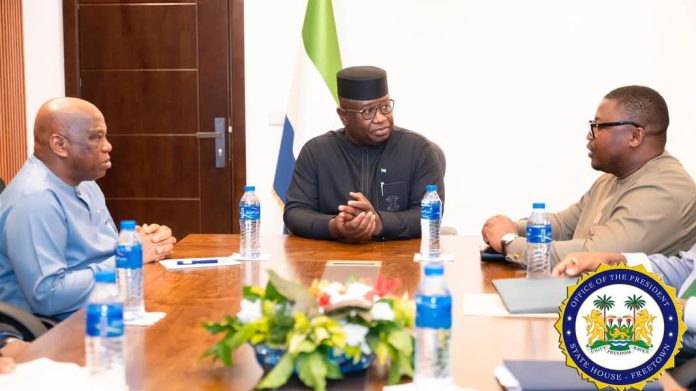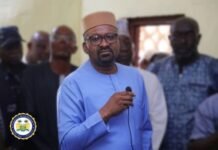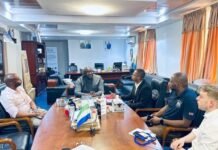By Amin Kef (Ranger)
In order to strengthen the diplomatic bond between Sierra Leone and Guinea, President Mamadi Doumbouya of Guinea dispatched a special envoy, Dr. Morissanda Kouyaté, to meet with Sierra Leone’s President Dr. Julius Maada Bio. Dr. Morissanda Kouyaté, who serves as Guinea’s Minister of Foreign Affairs, African Integration and Guineans Abroad, visited President Bio at State House, Freetown, on Tuesday, December 17, 2024.
The special envoy’s visit was marked by a cordial reception from President Bio. Dr. Morissanda Kouyaté extended greetings from President Mamadi Doumbouya and expressed Guinea’s intention to enhance the bilateral relationship between the two West African nations. During the engagement, he also addressed concerns surrounding the treatment of Sierra Leonean nationals residing in Guinea, expressing regret and promising corrective actions.
President Julius Maada Bio reciprocated the goodwill, emphasizing the historic and familial ties that exist between the citizens of Sierra Leone and Guinea. However, he did not shy away from addressing the mistreatment of Sierra Leoneans in Guinea. President Bio called for more constructive engagement to resolve such issues while reiterating Sierra Leone’s commitment to strengthening bilateral ties and ensuring the well-being of its citizens abroad.
Tensions between the two nations had recently escalated following Guinea’s forced repatriation of Sierra Leonean nationals. Sierra Leone’s Minister of Foreign Affairs and International Cooperation, Alhaji Timothy Kabba, revealed that the repatriation was conducted without due diplomatic protocol. Speaking at a Government press briefing at the Miatta Conference Centre on December 17, 2024, Minister Alhaji Timothy Kabba described Guinea’s actions as “undiplomatic, unfriendly and barbaric.”
“On December 10, 2024, I received a distress call from Sierra Leone’s Ambassador to Guinea, reporting that two trucks carrying Sierra Leonean citizens were sent to the border in a forceful repatriation attempt,” Minister Alhaji Timothy Kabba disclosed. Sierra Leone’s security forces refused entry to the returnees without proper identification and diplomatic procedures, sparking further discussions between the two nations.
Minister Alhaji Timothy Kabba highlighted that the Guinean Government’s operation targeted slum areas associated with crime and drug trafficking, leading to the arrest of foreign nationals, including Sierra Leoneans. While nationals from other countries were reportedly imprisoned, Guinean authorities opted to repatriate Sierra Leoneans, a decision criticized for its lack of diplomatic decorum.
Following the incident, Sierra Leone’s Foreign Ministry engaged in high-level talks with Guinean authorities. The result was an official apology from Guinea’s Government and a commitment to refrain from such actions in the future. The apology was delivered during an emergency meeting in Guinea, with Sierra Leone’s Ambassador and Guinean Foreign Ministry representatives present.
Minister Alhaji Timothy Kabba underscored the need for Guinea to adhere to international diplomatic norms. He also reminded his Guinean counterpart about the longstanding territorial issue of Yenga, stating, “Guinea’s occupation of Yenga is an act of aggression against Sierra Leone” and stressed that Sierra Leone’s sovereignty must be respected.
Minister Alhaji Timothy Kabba assured Sierra Leoneans that the Government is committed to protecting its citizens at home and abroad. “No matter how small our country may be, Sierra Leone is a sovereign state with significant power at many levels,” he emphasized.
He also addressed allegations of ethnic profiling and harassment within Sierra Leone’s security forces, stating categorically that neither President Bio nor the Government had sanctioned any form of discrimination. He apologized to any group that may have felt unfairly targeted, assuring that all issues will be handled with diplomatic tact and respect for human rights.
The Coordinator of the Office of National Security (ONS), Abdulai Caulker, provided further updates on national security. He reported that the ONS had implemented a comprehensive security plan that had already foiled an attempted coup in Waterloo and neutralized two fugitives linked to the November 26, 2024, coup attempt. The recent discovery of Sierra Leone’s largest kush (drug) production facility in Eastern Freetown was also attributed to nationwide intelligence operations.
ONS Coordinator Abdulai Caulker assured citizens that there was no ethnic targeting within Sierra Leone’s security forces, encouraging citizens to continue their activities without fear.
Inspector General of Police, William Fayia Sellu, highlighted the police’s adoption of modern surveillance technologies under the Smart City Project. He disclosed that 36 CCTV cameras had been installed across Freetown, enabling real-time monitoring from a central operations center. Inspector General William Fayia Sellu emphasized that police operations are impartial and do not target any particular ethnic group.
Civil society groups have also weighed in on the diplomatic and security developments. Valnora Edwin, President of the African Women Leaders Network, called on security forces to investigate allegations of tribal profiling with urgency. She urged the Government to strengthen its diplomatic engagements with Guinea to prevent further mistreatment of Sierra Leoneans living there.
Guinea’s commitment to deepening bilateral ties with Sierra Leone signals a possible reset in relations between the two West African neighbors. The visit by the special envoy, along with Guinea’s official apology, represents a significant step toward resolving the diplomatic impasse. As diplomatic talks continue, Sierra Leone’s Government remains focused on protecting its citizens and ensuring that issues related to Yenga and the treatment of Sierra Leoneans abroad are addressed comprehensively.




